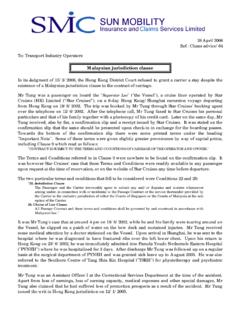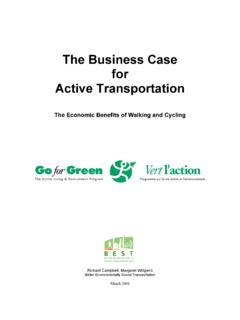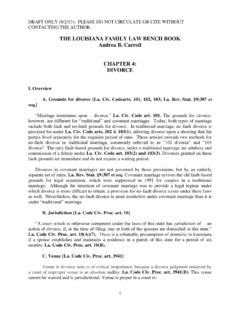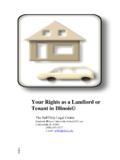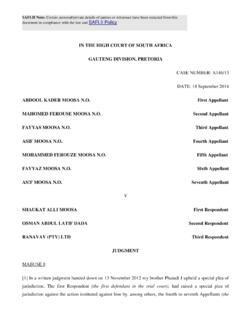Transcription of Chapter 15
1 Chapter 15. SMALL CLAIMS AND SUMMARY CAUSES. For personal injury claims, the jurisdiction level for summary causes is actions not exceeding the value of 1,500, exclusive of interest and Small claims are a category of summary cause, 2 and in relation to personal injury claims describe actions for payment up to the value of 750, exclusive of interest and expenses. 3 This Chapter is written against the background of an anticipated increase in the privative jurisdiction level for summary cause cases. It may be that all personal injury actions up to 3,000 or possibly 5,000 (excluding interest) will be treated as summary causes.
2 It is likely that personal injury actions will be excluded from small claims procedure. Consequently this Chapter does not deal with it. In the interim, practitioners are referred to the terms of the Act of Sederunt (Small Claims Rules) 2002. Choice of forum Ordinary Action or Summary Cause? It is increasingly important for agents to pick the proper forum from the start. Even although the new summary cause fees provide a reward for work properly carried out, there are significantly greater outlays involved with an ordinary cause action.
3 There is no point in raising a case as an ordinary action if you are going to be stuck at the end of it with summary cause expenses, and are unable to recover motion dues, record dues, proof fixing dues and shorthand writer costs. The rule as to scale of expenses is that the level is decided by the sum eventually decerned for unless the court otherwise directs (General Regulation 2). This means the amount contained in the court decree and not the sum sued for. If no sum is decerned for ( the defenders are successful) then an action raised as an ordinary cause will be taxed on the ordinary scale.
4 This causes no difficulty in debt actions for a crystallised sum. You simply choose the appropriate forum. What about personal injury cases where differing views on damages for solatium, or a finding of contributory negligence, might well pull a claim below the ordinary cause level? Level of expenses This paragraph deals with cases which have been raised as ordinary actions but which settled for sums below the summary cause jurisdiction level. The leading case in this area is Coyle v William Fairey Ltd,4 an action of damages raised in the Court of Session which sought payment of 10,000 and was settled in the sum of 1,000.
5 At that time this was within the summary cause level. The defenders contended that expenses should be awarded on the summary cause scale. The Lord Ordinary stated that because the value of the case was within the summary cause scale, the action should have been raised in the sheriff court. He awarded expenses on the summary cause scale without certification of counsel. The Inner House overturned this decision. The proper approach for the court was to consider whether the initial choice of forum was justified in all the circumstances of the case at the time the action was raised.
6 The pursuer had settled for 1,000, and it might readily be accepted that the settlement must have made some allowance for risk of failure on the merits or a finding of contributory negligence. Whilst the amount of settlement was a relevant factor, it was not determinative. In the event, having regard to the possible value of the case, the court awarded the expenses on the Sheriff Court ordinary cause scale with sanction for The courts cannot award more than you ask for. Macphail (2nd ed.) at states that the sheriff should consider two questions: 1.
7 Was the pursuer entitled to raise the action as an ordinary cause in the first instance? And if so, 2. Should the pursuer in the course of the action have taken steps to have it remitted to the summary cause roll? Mechanics of settlement The other important point relates to settlement of these cases. In most circumstances cases will settle either by means of agreement between agents, or by way of tender and minute of acceptance of tender. The language of the General Regulations has the effect that where the sum decerned for is within the summary cause limit, summary cause expenses only will be awarded, in the absence of argument to the contrary.
8 Practitioners should be careful not to forfeit 1. Sheriff Courts (Scotland) Act 1971, 2. ibid., (3). 3. Small Claims (Scotland) Order 1988. 4. 1991 638. 5. See also the case of Sunderland, 1992 1146 and the decision of Sheriff Principal McLeod in Durham v Gateway Food Market, 1992 83, (Sh. Ct). by default their right to argue the contrary. A competent tender must contain an unrestricted offer of expenses, 6 and any attempt to restrict expenses, to the Summary Cause scale will make the tender invalid. 7 This does not mean that you will get ordinary expenses whatever the settlement figure.
9 If the case settles by way of tender and minute of acceptance of tender, the court will make a decerniture which will regulate the scale of expenses unless the sheriff directs otherwise. Where you have raised an ordinary action, and accept a tender for below the summary cause level you will have to persuade the court that ordinary expenses should be awarded. A convenient way of bringing the matter to a head is to add a crave in the minute of acceptance of tender along the lines of: and moves the Court to grant expenses on the ordinary scale.
10 This will give you the opportunity to make the arguments discussed above. Extra judicial settlements Many cases settle on the basis of negotiation and exchange of cheques. Cases are frequently sisted to enable this to take place, and a joint minute is eventually lodged. A simple practical point is to make sure that there is agreement on the level of expenses, and that cheques for the principal sum and expenses on the ordinary scale are in your hands before the joint minute is lodged. Where the matter of expenses is still outstanding, you should ensure that the motion disposing of the case makes a finding of expenses for your client.
